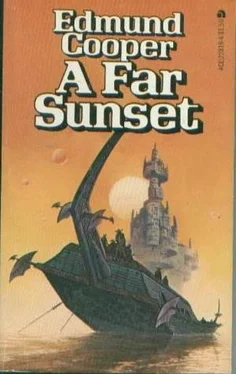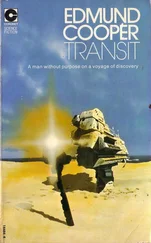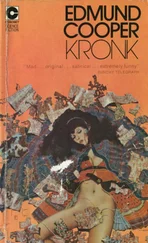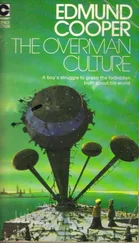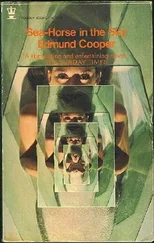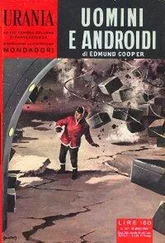The Bayani seemed to have a natural understanding of the force of the wind as they had of the force of flowing water. Already, a few of the more experimental and adventurous Bayani were building small gliders. It would be rather odd, thought Paul, but not entirely surprising if they developed successful heavier-than-air machines a century or two before they developed engines.
But there were other, more subtle changes that he had brought about and with which he was greatly pleased. Except as a punishment for murder and crimes of violence, he had abolished the death penalty. He had also completely abolished torture. For ‘civil’ cases and minor offences such as stealing, he had instituted trial by jury. Major offences were still tried by the god-king himself.
The one Bayani institution that he would have liked most to destroy he did not feel secure enough to destroy. It was human sacrifice—of which he himself would presently become a victim.
The Bayani had already seen many of their most ancient customs and traditions either modified or abolished. On the whole, they had reacted to change remarkably well—though Paul was acutely aware of the existence of a group of ‘conservative’ elements who bitterly resented change simply because things had always been done thus. At present die discontents were disorganized. They muttered among themselves, but still continued to adhere strictly to the principle of absolute loyalty to their absolute ruler.
If, however, they were pushed too far—as, for example, by the abolition of human sacrifice, a concept to them of fundamental religious importance—they could conceivably unite as a ‘political’ group. The one thing that Paul was determined to avoid was any danger of rebellion or civil war. It would have destroyed much of the progress that had been made so far. If successful, it might even have brought about a ‘burning of the books’ before books had had time to prove their intrinsic worth.
One thing was sure, because of the intrusion of a stranger who had risen to absolute power the civilization of Baya Nor could never again be static. It must go forward—or back.
So, in order to give his one-man renaissance the best possible chance of flourishing, Paul felt that he would have to leave human sacrifice alone. After all, it did not affect more than twenty people a year—most of them young girls—and the victims were not only willing to accept martyrdom, but competitively willing. It was a great distinction. For they after all, were the beloved of Oruri.
There was, of course, one potential victim who did not have such a comforting philosophy. And that was Paul himself. He wondered how he would feel about the situation in another thirty-seven days. He hoped—he hoped very much—that he would be able to accept his fate as tranquilly as Shah Shan had done. For, in the Bayani philosophy, it was necessary that one who knew how to live should also know how to die.
As he sat by the bank of the Canal of Life, reviewing the happenings of the last few months, Paul Marlowe was filled with a deep satisfaction. A start had been made. The Bayani were beginning their long and painful march from the twilight world of medieval orthodoxy towards an intellectual and an emotional sunrise. A man’s life was not such a high price for the shaping of a new society…
Paul sat by the Canal of Life for a long time. It was on such an evening as this, when the nine small moons of Altair Five swarmed gaily across the sky, that he had been wont to sit upon the verandah steps drinking cooled kappa spirit and philosophizing in words that Mylai Tui could not understand.
He thought of her now with pleasurable sadness, remembering the baffling almost dog-like devotion of the tiny woman who had once been a temple prostitute, who had taught him the Bayani language and who had become to all intents and purposes his wife. He thought of her and wished that she could have lived to bear the child of whose conception she had been so proud. He wished that she could have known also that Poul Mer Lo, her lord, was destined to become the god-king. Poor Mylai Tui, she would have exploded with self-importance— and love…
Then he thought of Ann, who was already becoming shadowy again in his mind. Dear, remote, elusive Ann—who had once been a familiar stranger. Also, his wife … It was nearly a quarter of a century since they had left Earth together in the Gloria Mundi … He had, he supposed, aged physically not much more than about six years in all that time. But already he felt very old, very tired. Perhaps you could not cheat Nature after all, and there was some delayed after-effect to all the years of suspended animation. Or maybe there was a simpler explanation. Perhaps he had merely travelled too far, seen too much and been too much alone.
The night was suddenly crowded with ghosts. Ann … Mylai Tui … An unborn child … Shah Shan … And a woman with whom he had once danced the Emperor Waltz on the other side of the sky…
He looked up now at this alien sky whose constellations had become more f amili ar to him than those other constellations of long ago.
He looked up and watched the nine moons of Altair Five swinging purposefully against the dusty backcloth of stars.
And his heart began to beat in his chest like a mad thing.
He counted the moons carefully, while his heart pumped wildly and his arms trembled and his eyes smarted.
He took a deep breath and counted them again.
There were now ten tiny moons—not nine. Surely that could only mean one thing…
Dazed and shaking, he began to run back to the sacred city—back to the private room where he still kept his battered, and so far useless, transceiver.
He stood on the small, high balcony of the Temple of the Weeping Sun. His eyes were fixed on the cluster of moons already approaching the horizon. There were still ten.
The transceiver was in his hand, its telescopic aerial extended.
He was still shaking, and sweat made his fingers slip on the tiny studs of the transceiver as he set it for transmission at five hundred metres on the medium wave band. If the tenth moon of Altair Five was indeed a star ship—and what an unlikely if that was! —orbiting the planet, surely an automatic continuous watch would be kept on all wave bands. But if it was a star ship, how the devil could it be a terrestrial vessel? It had arrived at Altair Five less than three years after the Gloria Mundi. Yet, when the Gloria Mundi had left Earth, apart from the American and Russian vessels, no other star ships— so far as Paul knew—had even left the drawing board. On the other hand, if it wasn’t a terrestrial vessel, what else could it be? A large meteor that had wandered in from deep space and ' found an orbital path? A star ship from another system altogether?
Paul’s head was a turmoil of possibilities, impossibilities and plain crazy hopes.
‘Please, God, let it be a ship from Earth,’ he prayed as he pressed the transmit stud on the transceiver. ‘Please, God, let it be a ship from Earth—and let this bloody box work! ’
Then he said, in as calm a voice as he could manage: ‘Altair Five calling orbiting vessel. Altair Five calling orbiting vessel. Come in, please, on five hundred metres. Come in, please, on five hundred metres. Over … Over to you.’
He switched to receive and waited, his eyes fixed hypnotically on the ten small moons. There was nothing—nothing but the sound of a light breeze that rippled the surface of the Mirror of Oruri. Nothing but the stupid, agitated beating of his heart.
He switched to transmit again. ‘Altair Five calling orbiting vessel. Altair Five calling orbiting vessel. Come in, please, on five hundred metres. Come in, please, on five hundred metres. Over to you.’
Читать дальше
